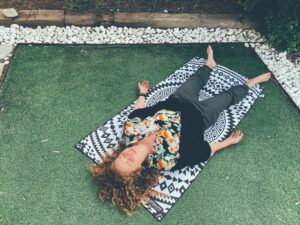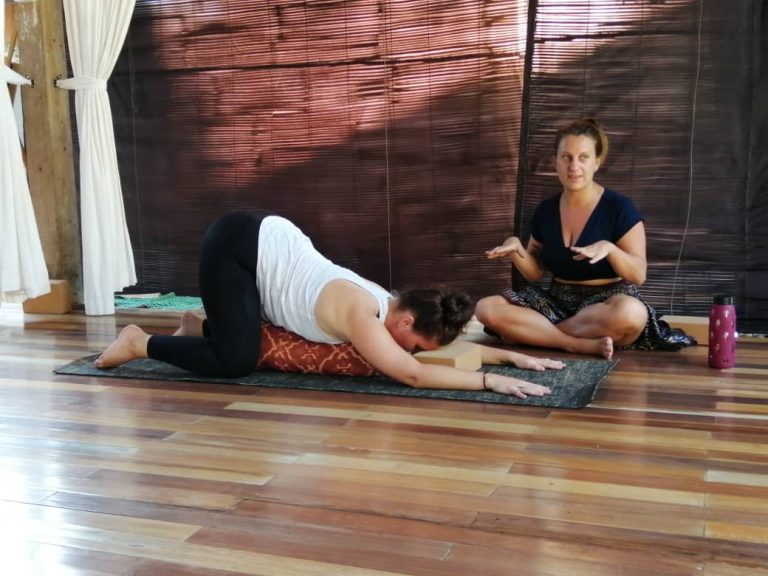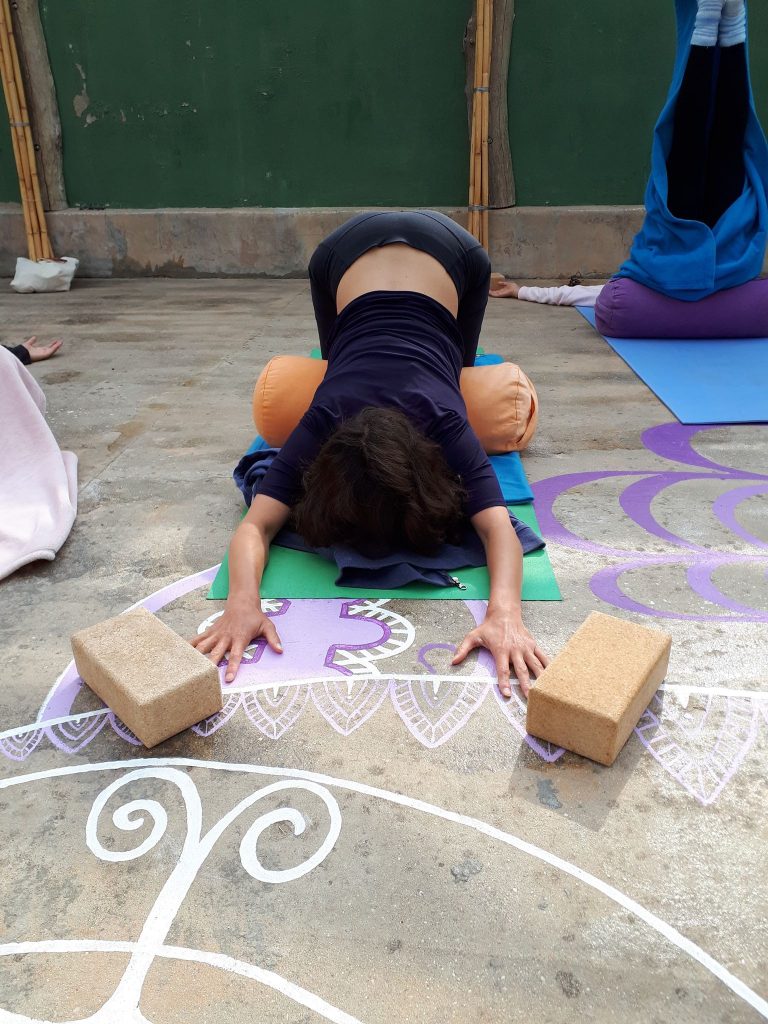Neuroplasticity & Mindfulness of Yin Yoga
– What is really happening in your brain when you practice Yin Yoga –
Written by Becky Khalil
Neuroplasticity is a term that has been thrown around in the past few years , and while it sounds scientific and complex, its concept can be relayed in a more simplistic way. So what really is neuroplasticity and why is it important for every Yoga teacher and Yoga teacher trainer to have a full understanding of its power within the Yoga space? Especially the Yin Yoga space?
In this article we are going to cover three main aspects:
1. What is Neuroplasticity (and how it can unconsciously change our life vs how we can use it to become master over our mind)
2. What it’s relevance is within the Yoga space (and specifically Yin Yoga)
3. Why ever Yoga teacher and Yoga teacher training should understand its power (and what the consequences are for practitioners if they do not)
What Is Neuroplasticity?
Neuroplasticity is the scientific term that refers to the ability for the brain to change and to form and recognise synaptic connections, especially in an experience of learning or inquiry.
It was believed for many years that when the brain passed a certain age it was stuck in its ways. This means that our thought processes, patterns, beliefs, behaviours and attitudes would not change. However, is this really the case?
The term “neuroplasticity” was first used by Polish neuroscientist Jerzy Konorski in 1948 to describe observed changes in neuronal structure (neurons are the cells that make up our brains). Although the term wasn’t widely used until the 1960s this sparked interest and intrique in many neuroscientists.
Neuroplasticity is referring to the adaptability and malleability of the brain due to its physiological changes that come as a result to our interaction with the environment. From utero until the day we die, the connections in our brains reorganise in response to our ever changing needs and environment. In other words, everything you come into contact with, consciously and unconsciously is feeding your brain and that thus structuring your brain.
So, what does this have to do with Yoga?
What is The Relevance of Neuroplasticity To The Yin Yoga?
Remember this: “Neuroplasticity is the scientific term that refers to the ability for the brain to change and to form and recognise synaptic connections, especially in an experience of learning or inquiry.”? Let’s break this down.
What do we do in Yoga? Just to name a few things, we breathe (pranayama), focus (drishti) , discipline our mind and body (tapas), and lastly we learn how to practice Yoga (Sadhana). It is the learning phase that is important.
Any good quality, well educated Yoga teacher should be teaching their students what Yoga is and how to practice it both in asana and philosophy, on and off the mat. Therefore we are creating new synaptic connections and disempowering old ones, thus restructuring our brains, everytime we come to the Yoga practice due to this learning and inquiry.

Neuroplasticity in Yin Yoga
Neuroplasticity in the Yin Yoga practice is particularly important to understand. Why? In Yin Yoga you are bringing the brain down into the lower brain waves states, anywhere between Alpha and Theta. These are the brain wave states of calmness, relaxation and deep rest, but not quite the level of deep dreaming sleep which is Delta. These are also the brain wave sates of that space in between wakefulness and sleep in Yoga Nidra. The space of pure consciousness, These are also the brainwave states of hypnosis.
So the question is, is what is happening in Yoga Nidra and maybe even hypnosis, happening in Yin Yoga too? I am not writing to give a scientific answer. I am writing to help you think about the power that Yin Yoga has, specifically in the brain in terms of how we can re-wire the brains connections, patterns and neuropathways, depending on the way that we teach Yin Yoga.
Consequences of Not Understanding Neuroplasticity in Yin Yoga
Not a huge amount of Yoga Teachers understand neuroplasticity. Why would they? They didn’t necessarily go to university to do a neuroscience degree. Neither was it included in their Yoga teacher training or any of their materials or reading lists. It is not often that Yoga teachers, Yoga teacher trainers, Yoga schools or Yoga teacher training courses take into account the brain in such a way, giving such deep importance to its plasticity. This is detrimental to say the least. You don’t need to be a neuroscientist to understand the basic concept of how it works and how we can help others use its power towards positive self development.
Here are a few consequences if neuroplasticity and its potential is not recognised in the Yin Yoga practice:
1. Practitioners are being restricted from the power potential of the practice
2. Yoga teachers may be feeding, and therefore re-wiring, negative or unhelpful beliefs, patterns and behaviours in the brains of their students and be unaware of it.
3. Yoga teachers are lacking an important and powerful tool to share and integrate within the Yin Yoga practice that leads towards self empowerment and self agency

So What Should We Be Doing?
First of all I urge you to pick up a neuroplasticity book or go to a neuroplasticity yin yoga teacher training course. There aren’t many but they do exist. This will start to help you understand the capability of the brain and what that means in the Yin Yoga space.
Secondly, what we learn we should bring into our classes to help create positive connections, patterns and behaviours. Repetition of this is key and may offer a specific workshop or class series that can focus on this re-learning / re-wiring.
Thirdly, I urge you to bring this concept of neuroplasticity into your everyday life. Listen and inquire into your patterns, beliefs, behaviours and patterns. What are they? Can you notice them? Can you empower the positive ones and disempower the negative ones? This requires a great deal of focus and intentful mindfulness.
Lastly, start practising and studying mindfulness as it is one of the main principles of neuroplasticity.
Thank you for reading
We have a variety of Yin Yoga teacher training courses that keep topping up your heart, mind and soul:
Yin Yoga Teacher Training Online:
Yin Yoga Teacher Training: 100 hour Functional Anatomy and Chinese Medicine
Yin Yoga Teacher Training: 100 hour Pranayama, Meditation and Mindfulness
Yin Yoga Teacher Training: 80 hour Yin Yoga and Yoga Nidra
Yin Yoga Teacher Training: 50 hour Neuroplasticity and Mindfulness
Yin Yoga Teacher Training: 50 hour Essential Oils and Emotional Intelligence
Residential Yin Yoga Teacher Training:
Yin Yoga Teacher Training: 100 hour Functional Anatomy and Chinese Medicine
Yin Yoga Teacher Training: 100 hour Pranayama, Meditation and Mindfulness
Yin Yoga Teacher Training: 80 hour Yin Yoga and Yoga Nidra
Yin Yoga Teacher Training: 50 hour Neuroplasticity and Mindfulness
Yin Yoga Teacher Training: 50 hour Essential Oils and Emotional Intelligence
Yin Yoga Teacher Training: 200 hour 5 Bodies Approach
Locations:
Yin Yoga Teacher Training Bali
Yin Yoga Teacher Training Thailand
Yin Yoga Teacher Training India
Yin Yoga Teacher Training Spain
Yin Yoga Teacher Training Australia
Yin Yoga Teacher Training Guatemala
We also have a variety of Yin Yoga Retreats and Yoga Holidays:
Soulful Sound Yoga Retreat: Mallorca
Yin Yoga Retreat Bali: Sacred Space Yoga








